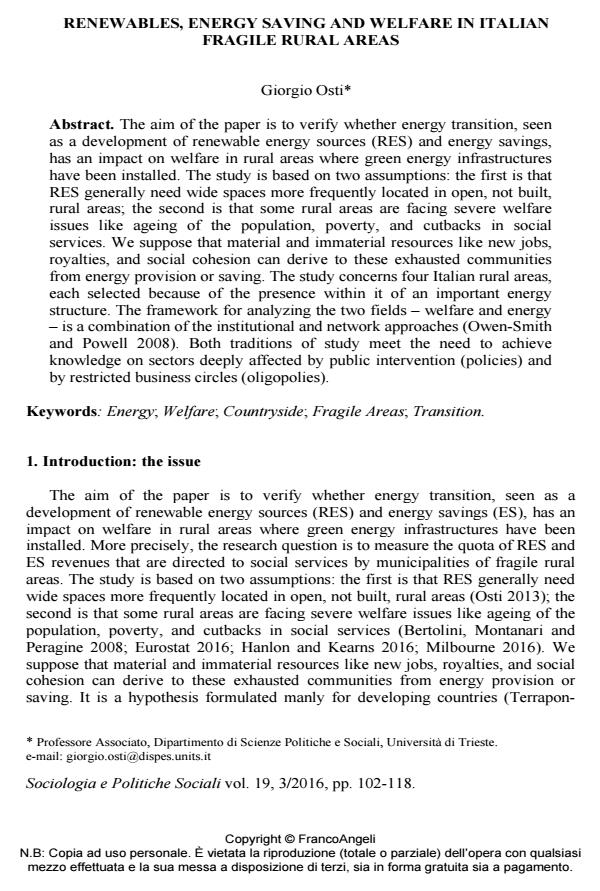Renewables, energy saving and welfare in Italian fragile rural areas
Titolo Rivista SOCIOLOGIA E POLITICHE SOCIALI
Autori/Curatori Giorgio Osti
Anno di pubblicazione 2016 Fascicolo 2016/3
Lingua Inglese Numero pagine 17 P. 102-118 Dimensione file 226 KB
DOI 10.3280/SP2016-003007
Il DOI è il codice a barre della proprietà intellettuale: per saperne di più
clicca qui
Qui sotto puoi vedere in anteprima la prima pagina di questo articolo.
Se questo articolo ti interessa, lo puoi acquistare (e scaricare in formato pdf) seguendo le facili indicazioni per acquistare il download credit. Acquista Download Credits per scaricare questo Articolo in formato PDF

FrancoAngeli è membro della Publishers International Linking Association, Inc (PILA)associazione indipendente e non profit per facilitare (attraverso i servizi tecnologici implementati da CrossRef.org) l’accesso degli studiosi ai contenuti digitali nelle pubblicazioni professionali e scientifiche
The aim of the paper is to verify whether energy transition, seenas a development of renewable energy sources (RES) and energy savings,has an impact on welfare in rural areas where green energy infrastructureshave been installed. The study is based on two assumptions: the first is thatRES generally need wide spaces more frequently located in open, not built,rural areas; the second is that some rural areas are facing severe welfareissues like ageing of the population, poverty, and cutbacks in socialservices. We suppose that material and immaterial resources like new jobs,royalties, and social cohesion can derive to these exhausted communitiesfrom energy provision or saving. The study concerns four Italian rural areas,each selected because of the presence within it of an important energystructure. The framework for analyzing the two fields - welfare and energy - is a combination of the institutional and network approaches (Owen-Smithand Powell 2008). Both traditions of study meet the need to achieveknowledge on sectors deeply affected by public intervention (policies) andby restricted business circles (oligopolies).
Parole chiave:Energy; Welfare; Countryside; Fragile Areas; Transition
- Ecopreneurs, rural development and alternative socio-technical arrangements for community renewable energy Natalia Magnani, Mara Maretti, Rita Salvatore, Ivano Scotti, in Journal of Rural Studies /2017 pp.33
DOI: 10.1016/j.jrurstud.2017.03.009 - Hydropower: renewable and contributing to sustainable development? A critical analysis from the Mazar-Dudas project (Ecuador) Diana Mendieta-Vicuña, Javier Esparcia, in Local Environment /2022 pp.375
DOI: 10.1080/13549839.2022.2048256 - Wild Wind, Social Storm: “Energy Populism” in Rural Areas? An Exploratory Analysis of France and Italy* Stéphanie Dechézelles, Ivano Scotti, in Rural Sociology /2022 pp.784
DOI: 10.1111/ruso.12399 - Controvento: aree marginali e populismo energetico? Indicazioni preliminari su uno studio di caso Ivano Scotti, in SOCIOLOGIA URBANA E RURALE 128/2022 pp.125
DOI: 10.3280/SUR2022-128011 - La política de energía eólica y sus efectos sobre el desarrollo local. Un análisis a partir del sistema de actores (Loja, Ecuador) Diana Mendieta Vicuña, Javier Esparcia Pérez, in Anales de Geografía de la Universidad Complutense /2020 pp.73
DOI: 10.5209/aguc.69333
Giorgio Osti, Renewables, energy saving and welfare in Italian fragile rural areas in "SOCIOLOGIA E POLITICHE SOCIALI" 3/2016, pp 102-118, DOI: 10.3280/SP2016-003007